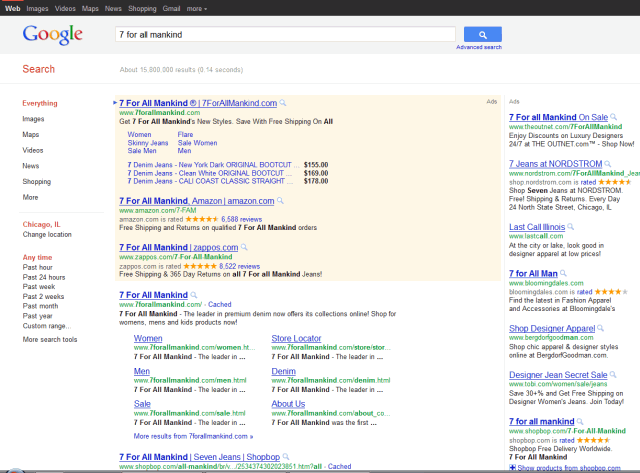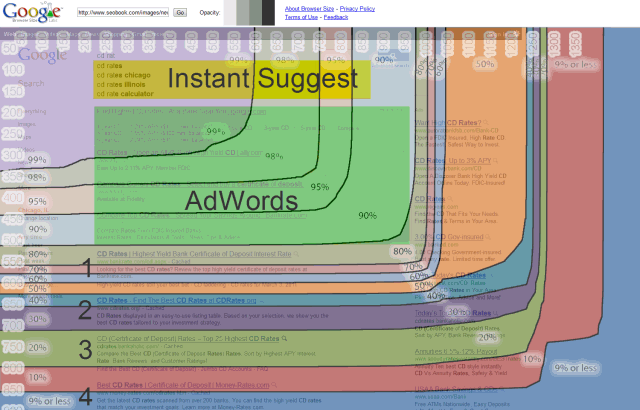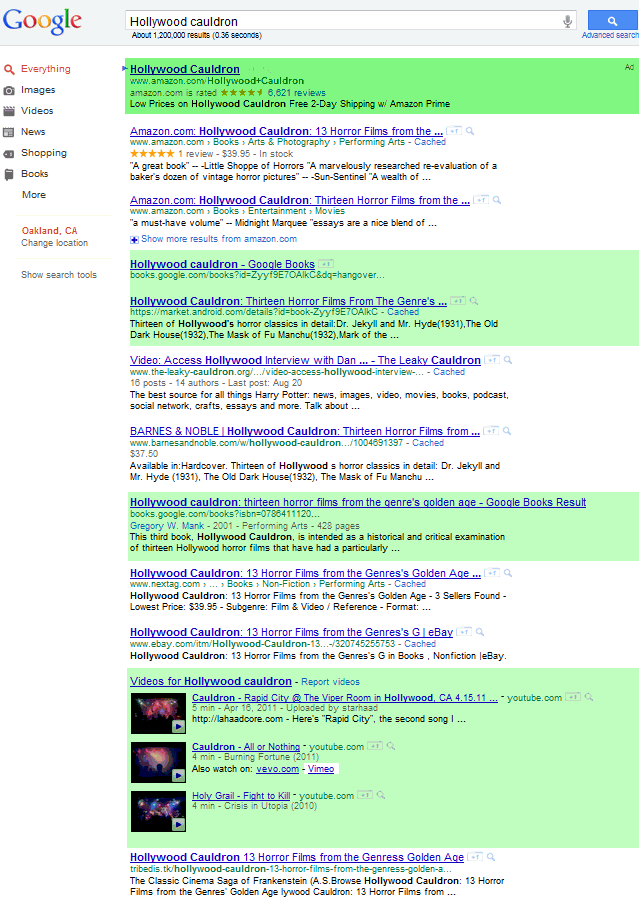The Future of Your SEO Career

So here we are, aren't we? It's 2011, SEO is still not dead (despite a decade of claims to the contrary), but the landscape is very, very different in this post-Panda world. Most sites that have been hit by Panda (inclusive of all iterations) are still on ice some 7 months after the initial roll out.
Businesses have been destroyed, livelihoods ruined, and the future of a once thriving business is seemingly on the ropes for newcomers and seasoned veterans alike.
Seems like a good time to dial this up:
This all appears to be just fine with Google. As Eric Schmidt once said, "Brands are how you sort out the cesspool". How very elitist of you Mr. Schmidt.
What exactly is a brand anyway, to you? Is it content factories ranking for medical queries like "How to survive a heart attack" and other assorted medical terms?
Or maybe you think an article that is in the running for queries around avoiding heart attacks, written by a guy with an English degree, is something that isn't part of a cesspool?
Matt Cutts has highlighted health issues as a great example of why selling links was "evil." What his post didn't disclose at the time was that Google had built a half-billion Dollar enterprise selling illegal drug ads!
I don't know about you, but I sure don't want to read an article on a medical topic that could have life or death implications which is written by a guy with an English degree! The point is that the lines continue to become extremely blurred and the algorithm "adjustments" continue to become more and more severe.
The combination of those two attributes must give an SEO pause when thinking about short, mid, and long term strategies for their business model. One mistake or one algorithm update (completely out of your hands) can have devastating consequences for your business.
Talk is Cheap
Now we can queue the white hats (whatever the heck that means) who will now wax poetic about building "brands" the right way (whatever the heck that means) and begin to play the "I told you so" game as you struggle to survive. Keep in mind that salespeople will use your uncertainty against you, and try to calm your fears by telling you "everything is ok if you do things the right way".
Problem is, what is the "right" way and why aren't "they" doing it? There is no "right" way, rather, just all sorts of shades of gray.
Don't buy into the hype and save yourself a bit of sanity. The same people who will whip out their white hats at the first sign of algorithmic shifting are the same people who want to sell you something that, at its core whether it's a tool or product, is designed to give you information on how to manipulate search results (irrespective on how they frame the language).
Bottom line is that folks in the industry are confused, scared, nervous and it's easy for salespeople to prey on the scared and the informationally-poor to enhance their bottom line.

Keep this quote from Voltaire in mind when you are searching for answers or guidance in these times of uncertainty:
The comfort of the rich depends upon an abundant supply of the poor.
The best defense is education, experience, and information.
The Shrinking Google SERP
It's getting harder to breathe in the SERPS. We routinely point this out in various blog posts, but I thought now would be a good time to revisit this problem. As it continues to appear as if Panda was less about content farms and about something a bit more sinister the incredibly shrinking organic SERP is cause for concern as well:
Here you see one site with extended AdWords and organic sitelinks:

If you're not in the top 3, well then you're pretty much not in the game:

So much for SERP diversity:

A few key takeaways when looking at these results are that:
- Competing and monetizing just on search traffic is probably not a good long term strategy (but can work short-mid term)
- Google continues to layer on Google "stuff", becomes another competitor that is almost impossible to beat
- You might want to explore PPC a bit more than you have in the past for more visibility, if the margins are available
It might make some sense to start evaluating the cost of your SEO efforts and figuring out how they could translate into getting your foot into other areas of traffic acquisition online via targeted advertising, media buys, monitoring blogs and forums for discussions about your market, keywords, or products. Spread the funds out to get maximum exposure in multiple areas (for both short term and long term positioning)
As you can see from the images, the long term viability of just relying on search engine traffic is likely to be a losing proposition.
Leveraging Your SEO Skills
SEO has long been more about marketing than making sure your title tags are perfect. A good SEO is a good marketer and it's been said on this blog over the years that SEO really should be part of a more holistic approach to an overall marketing strategy. However, many of you reading this might be in affiliate or Adsense camp rather than a full service SEO agency.
The good news for the SEO agency is that you have all sorts of ways to leverage your SEO skills. You can get into things like:
- conversion optimization
- email marketing
- online media buys and adverts
- analytics services
- social media services
- the venerable "design and development" market
- offline advertising and tracking
- local SEO and Google Places SEO as well as Yahoo! and Bing local
The options listed above are all items that can quite easily come up within the context of an SEO proposal or discussion and should make for fairly doable cross-sales or up-sells.
The problem with just selling rankings or traffic is that it's all too easy for the client to dismiss you after you've achieved rankings. What's worse, even if you achieve rankings there are no guarantees of results and going back to the client 4 months in to up-sell conversion optimization is usually a non-starter if the stuff you've delivered thus far is of little value ROI-wise.
No matter how effective your performance is, as an SEO you are working in someone else's ecosystem. Google may extend the AdWords ads or insert their own product search or local search or video search results right at the top and push your work down.
Part of your SEO career planning, if you are in it for the long haul, should involve you starting to take a serious look at some level of client work and/or refine your product offering to a more holistic one rather than one with a singular focus.
Affiliates Feeling the Squeeze
Since Google has clearly shown its true colors with respect to how they view affiliates on the AdWords side is it that hard to believe that is how they view affiliates on the organic side? In fact, one of our members received this email when applying their AdWords credit:
Hello Aaron Wall,
I just signed up for the Get $75 of Free AdWords with Google Adwords. After receiving an e-mail stating that I was to call an 877 number of Google Adwords, I was told in my phone call that affiliate marketing accounts were not accepted. I guess I confused by this statement. Is this in error? Or am I not understanding the Tip #3 for setting up an account for Google Adwords for promoting a website?
Thank you in advance for your time.
Sincerely,
Carole
Do you remember this video where the body language suggests AdSense is ok but OMG YOU'RE AN AFFILIATE (at approximately 0:38)!
Diversity, Diversity, Diversity
To counteract being viewed as a "thin affiliate", I'd suggest reading up on SugarRae's blog, specifically her affiliate marketing section.
Clearly you can build a quality affiliate site that is quite profitable, but how many can you reasonably expect to build out into thick, market leading sites without scaling high on internal costs to the point where margins become an issue or until Google monopolizes your SERPS?
Diversity is still key with respect to revenue streams but diversity between different revenue types (affiliate, adsense, client, product) is what you should be aiming for rather than just your garden variety diversity in revenue (just different sites of the same monetization method)
Where Do You Go From Here
The best thing you can do for your business is to stay out of debt. This is much easier said than done, especially if you live in the US where debt slavery is the norm and gets pretty ugly before you even have a chance to earn real money.
Being mostly debt free with some savings put away not only puts you in a better spot than most consumers but it also allows you to be less subjected to the whimsical nature of Google. Also, you can afford to be more patient, invest in new opportunities, and be less stressed out if some of your stuff turns down for a bit.
I'd venture to say that debt is probably a major reason why some folks went out of business after the Panda update and being debt free with some backup savings and income diversity helped keep some folks in the game.
Taking the First Steps
I would suggest that you take stock of your personal financial situation, your current revenue streams, your skill sets, and your feeling on the overall landscape of the industry and then start to make some decisions on the future of your career. With any update or change there are usually new opportunities that arise from the ashes of Google's scorched earth policy (or policies).
Now that Google is overtly spamming their own "organic" search results to try to capture the second click, riding as a parasite posting content on their own parasitical platforms is likely going to be an extremely profitable strategy in the coming years.
You might not make as much money posting content to Youtube as you made posting it to your own site, but you NEVER have to worry about Youtube disappearing from the search results.
The barrier to entry is getting much higher and rising fast. You need patience, capital, reliable/trusted information sources, and a bit of luck to succeed going forward. Within the span of a couple years it's gone from (mostly) the wild west to survival of the fittest. How do you plan on surviving?




Comments
What ever it happens, not everybody in our network will turn back.
I learned everything I know about marketing and SEO from you guys. I have all of you to thank for giving me a very defensible skillset. Years ago when I first got into this field, my roadmap was SEO Book and Stuntdubl then later Occam's Razor, SEO Dojo then SEO Theory. Along the way, I picked up Seth Godin from Sir Wall and copywriting from Copyblogger and studied linkbaiting at Tropical SEO/Solo SEO.
Now due to all of you, I'm able to run an agency on the side while employed at a full time job. None of this would have been possible without SEO Book, so thank you again.
If you ever see me in reality, just say I'm one of the guys/gals at SEO Book and I'll buy you folks a dinner or whatever is reasonable :)
Cheers,
Jey
SEO is vastly important, but just a piece of a sound online strategy.
Depending on your role, it's unlikely you can just know SEO (in the limited, traditional definition) and achieve Linchpin status - unless you REALLY own that space and find an opportunity (probably in the agency world) to focus solely on the algo and site tweaks.
For the rest of us (99% of us), "SEO" as a label doesn't do it justice. We must know a good deal about all of the above. Nobody will be an expert in SEO, CRO, LPO, PPC, social, front-end coding, back-end coding, email, etc - but you'll need to know enough in each realm to avoid pitfalls.
A lot of the most profitable opportunities in business come from blurring the lines between 2 different disciplines.
The more disciplines you know (& the more fluidly you can combine them) the harder it is to "replace" you with software, outsourcing, someone willing to do "the same job" a bit cheaper, etc.
Google cannot survive with ads alone. It's SEO (content) that makes Google ultimately survive. Although Google is experimenting constantly with multiple search displays, the core of Gooooogle is based on "organic" search. In other words, if Google becomes all ads, then the searcher will begin searching somewhere else. (ie Bing, Facebook, and the yet to come.)
... the first:
SEO & content are not the same thing. See the green highlighting in the above image. That shows Google hosting the content they want to rank. They have direct access to it & it is on their servers. They can insert it right in the search results with no SEO required.
A lot of big tech companies (like Google, Apple, Amazon & Facebook) are playing / trying to play the "access to content" gateway game. And while they all have different terms, they all tend to be benign dictators in their own ways.
... the second:
Google can aggressively monetize keywords & verticals that are commercially oriented, while running fewer ads on keywords that are less commercially oriented. Google has in fact been doing this for nearly a decade.
Aaron, Great post and I am shocked it's not getting more play. I have been seeing the writing on the wall for sometime now. Its been very difficult to get sites to move the last 8 months if at all. I have been working hard to transition out of the SEO business for the last few months.
... I am seeing plenty of movement on many sites in the past 8 months & am not in any rush to give in/quit. This cow still has plenty of milk.
I wouldn't suggest anyone quit, but rather double down on the winning bets while perhaps cutting some of the distractions. That was in large part what this post was about: building incremental revenue streams, diversifying your revenue sources, staying out of debt, etc.
That gives you more flexibility.
If you have savings and no debt then you can roll with the punches, but if you are levered to the hilt you can't afford to take certain risks & some of those risks might be required to stay competitive...thus risk avoidance becomes success avoidance & sets one up for a fall.
I have been saying this for months: Google realized to continue to grow, they can't give away top positions.
They essentially want organic search to be worthless for all but the largest and oldest site/brick and mortar. How many does that leave - 99.9999% of all the other sites in the world will spend their money in Adwords, and not in SEO. SEO will be about improving quality score and not organic position. They are doing it slowly, but surely because they don't want to change behavior.
And BTW - why should Google be in a position to determine if Medical information on a site is accurate? They are putting that as an example since people can associate with it, but it's not a decision for them. See a doctor, and don't use the web to determine if you have a disease or just gas.
As their marketshare growth has stalled (they stopped gaining real estate) they had to "develop" more of the real estate they already have to hit the numbers. Which is precisely why YouTube has been promoted so aggressively over the past 7 months.
Matt once used a link seller who was selling links to a sketchy outfit of an example of why buying links was bad. At the same time Google was pulling in hundreds of millions of ad Dollars by selling illegal ads to overseas pharmacies. And Google could say they didn't really believe in the pharmaceutical laws, but if that was the case then why are they now running ads on Youtube warning you against buying fake Viagra?
Hi Aaron. Speaking of spamming their oganic SERPs, on my laptop I can't see the background highlighting for the adwords ads at the top of the SERPs. Since I work in SEO I know they're there so I push my laptop monitor way down until it's almost touching the table so I can see where the organic results start. If they're testing this adwords background highlighting on laptops where you have to push the monitor way back to see where the adwords are then this is deliberate spamming; not much different than hidden text imo. Most people with these laptops will just click on what appears to be the first result not knowing that someone paid for it to be at the top and didn't earn it organically. My girlfriend was doing this until I pointed out that these are paid ads; really annoying that Google's doing this.
Add new comment